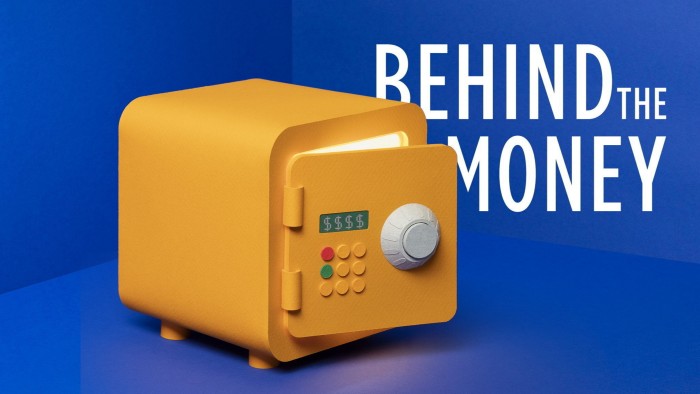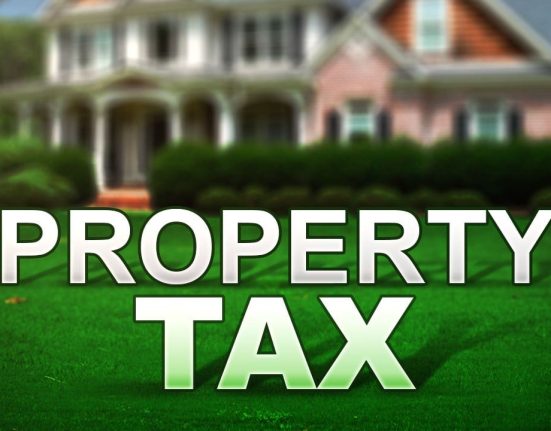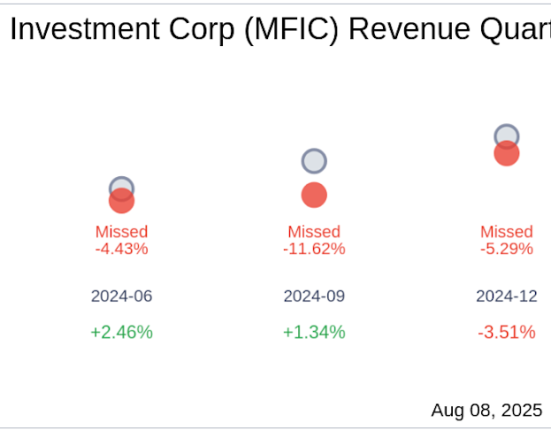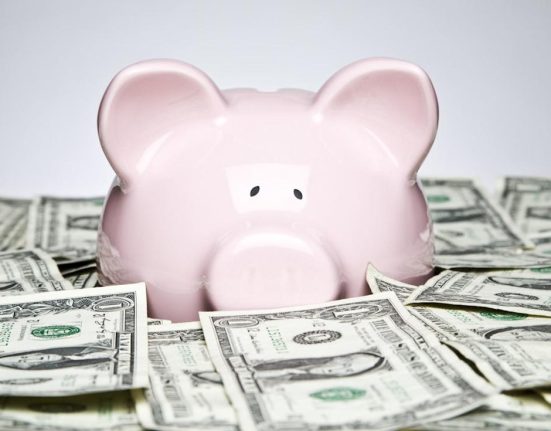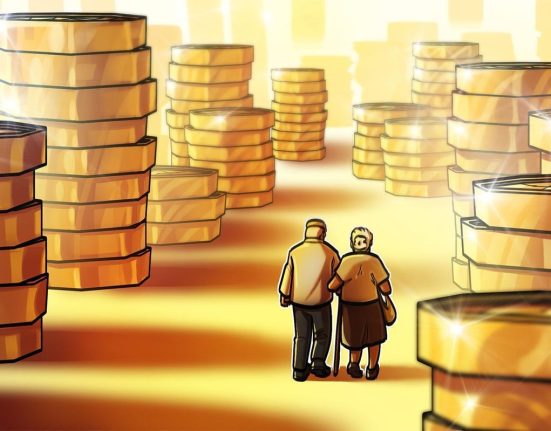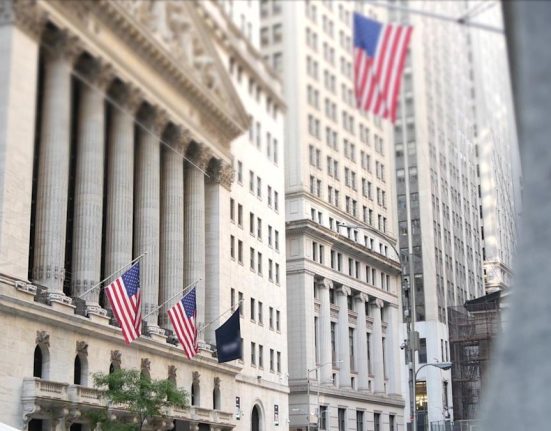This is an audio transcript of the Behind the Money podcast episode: ‘Why Islamic banking is taking off’
Saffeya Ahmed
It’s a March morning in Islamabad, and my colleague Humza Jilani is out at a branch of Pakistan’s most successful bank: Meezan Bank.
It’s almost the end of Ramadan, and the big celebration of Eid is just days away. Once Humza makes his way inside the bank, he finds lots of people taking out cash to give as gifts. It’s an age-old tradition for the holiday. He stops and he talks to one guy who is sitting with a bank teller to do exactly that.
Ali Shams voice clip
Islamic banking, basically, as a Muslim, is a . . . (speaks foreign language)
Humza Jilani
Ali Shams is a 46-year-old banquet hall owner in Islamabad, essentially owns a venue that’s very popular for weddings, one of the big-spend items in Pakistan.
Saffeya Ahmed
What’s unique about the bank that Ali is using is that it’s an Islamic one. And that means that you can’t charge interest, because that’s strictly forbidden in Islam. Humza is here at Meezan to talk to people about why they would prefer this type of banking.
Ali Shams voice clip
(Speaking in foreign language)
Humza Jilani
He’s saying that it doesn’t bother him that he gets less of a return at Meezan, an Islamic bank, than he might get at one of the conventional bank because the satisfaction he gets in his soul when he goes to bed at night knowing that he’s not stuck in the forbidden world of interest is priceless.
Saffeya Ahmed
Other people that Humza talks to say the same thing.
Yousuf Shah voice clip
(Speaking in foreign language)
Saffeya Ahmed
One man tells Humza that banking Islamically is his duty as a Muslim, and that he believes he’ll have to answer to God for how he manages his money.
Humza Jilani
This is a Muslim country where people really take seriously the Islamic principles that really stand in contrast to how we understand banking.
Saffeya Ahmed
About a quarter of all Pakistan’s deposits in the banking sector are now done Islamically. This banking style has taken off in the past two decades, even though it doesn’t charge interest. So it’s way less profitable for retail customers. And now the country has even set a goal of switching to all-Islamic banking by 2028.
Humza Jilani
What Pakistan is trying to do here is pretty unique, because there’s no other country that I can think of that’s taken their entire conventional banking system and tries to, in just a few years, completely transform it into a fully interest-free economic system. And we’ll have to see if they can pull it off. It’s a lot more challenging than you might think.
[MUSIC PLAYING]
Saffeya Ahmed
I’m Saffeya Ahmed from the Financial Times. Today on Behind the Money: not charging interest goes against the basis of banking as we typically know it. So how exactly does this work? And can Pakistan really go all-Islamic?
[MUSIC PLAYING]
If you’ve never heard of Islamic banking, let me give you the TL/DR. It’s finance that’s fully in line with Islamic values. That means as a bank, there’s no loaning to alcohol companies or to casinos or investing in pork products.
Humza Jilani
But most importantly, it’s a system that says that you can’t make money just off of money. And in practice, it is a system that bans a fixed interest rate.
Saffeya Ahmed
Interest is explicitly forbidden in Islam because it’s considered unethical and it promotes wealth inequality. Banks can profit even if you are losing. Humza tells me though that the bank that he visited, Meezan Bank, has been thriving regardless of that interest restriction.
Humza Jilani
Meezan has been Pakistan’s most profitable bank for the last three years and its shares keep rising each year and it’s basically crushing the competition and outdoing the conventional banks that have been around for decades longer than it has.
Saffeya Ahmed
Being Muslim myself, I get the popularity factor of these kinds of banks. I would happily take a less lucrative Islamic banking choice here in New York if it existed, because that would mean that my money is managed in line with my religion. But I realised not everyone would make that choice. So to hear that this type of bank is actually outdoing conventional banks was really shocking. I wanted to sit down with Humza and figure out how exactly that is.
So for a lot of our listeners, Humza, this is a pretty radical concept if you’re used to banking that’s based on the interest rate. So how do Islamic banks make money?
Humza Jilani
So the kind of core of Islamic banking makes money off of this idea of profit sharing and profit and loss. So you’re not guaranteeing a fixed interest rate. You’re rather saying that you’ll get a share of the profit of how well this asset does or how well my company does, or instead of giving you a loan, I’m gonna buy the asset and lease it to you and give you the right to buy it off at the end of the lease, that there’s a real focus on ownership that isn’t just based on making money off the value of the loan that you had written.
Saffeya Ahmed
So let’s recap. Instead of making money off of an interest rate, everything is asset-based. In theory, that means the bank will invest your money in a physical asset like land or real estate or even a company. And then you make a return based on how well that thing performs. Now, as you can expect, the returns on that are going to come a lot slower. They’re a little less risky, but you don’t make nearly as much money back if things go well.
So Humza, what does this look like? What does Islamic banking look like in other Muslim-majority countries, like say Saudi Arabia or Malaysia?
Humza Jilani
So in countries like Saudi Arabia or Malaysia, their Islamic banking sectors are a lot older and a lot more mature, with a lot more availability of Islamic financing tools. They have a huge market and they’ve sort of reached a critical mass of people banking in this way that keeps the market going on its own.
Saffeya Ahmed
The critical mass of people that Humza mentioned is the key piece here. Islamic banking is costly and it’s not nearly as profitable, so you need enough people using these kinds of banks to pump enough money into the system. That’s why you don’t see Islamic banks in the US or the UK, for example. There’s just not enough people that want to Islamically bank. But Pakistan has the second-largest Muslim population in the world, so they definitely have the ability to achieve that critical mass. They just haven’t yet. So Humza, where does the story start then? Like why now for Islamic banking?
Humza Jilani
Yeah, so in Pakistan, you have a middle class that has expanded significantly in the last 20 years and they tend to be more religious. Pakistan is a Muslim-majority country and one of the most conservative in the world. And that religiosity is primarily among some of the new rural-to-urban migrants who find in religion a sort of sense of community.
Saffeya Ahmed
Those people Humza’s describing were pretty much unbanked before this boom. And he tells me that if there’s no Islamic option, a lot of them would continue to not bank at all, leaving Pakistan with millions in untapped cash.
Humza Jilani
They just generally want to live a life without the risk of violating what they consider a sacrosanct Islamic principle.
Saffeya Ahmed
Now with Meezan Bank, there’s one big reason why it’s outperformed its secular rivals in recent years. It’s because of a type of government paper that Meezan has been buying called a sukuk. And that, combined with a recent financial crisis in Pakistan, has spelled great success.
Humza Jilani
So the main instrument of Islamic banking in Pakistan is the sukuk, which is a bond-like instrument sold by the government where people buy it and they get promised a certain profit that the government will pay them. And that profit is often indexed to the interbank rate, which is related to the interest rate set by the central bank.
Saffeya Ahmed
Typically, sukuks should be asset-tied, to land or real estate like we were talking about, that profit and loss concept. But in Pakistan, these function a little differently, and it sounds quite similar to any government bond. Pakistan has a central bank, it sets interest rates, these sukuk bonds make returns basically based on that rate. How can that be allowed when the whole system is meant to be interest-free? Well, the easiest way to explain it is that Pakistan allows its Islamic banks to kind of mimic interest rate returns, in the hopes of making the sector competitive with traditional banking.
Humza Jilani
Religious leaders know that the Islamic option for a lot of banks is less appealing from a profit perspective. So they have to find some way to make them competitive and incentivise conventional banks to want to go Islamic. And in order to incentivise these conventional banks, they are going to need to provide a short-term measure such as allowing a sukuk to be based on something interest-like in order to let the industry as a whole grow. They basically see it as giving the Islamic banking industry a leg up.
Saffeya Ahmed
So these sukuks are a big reason why Islamic banking is catching on. But the industry really took off two summers ago, when Pakistan’s economy hit a low point.
Humza Jilani
So the Pakistani government really came to the cliff’s edge of default in the summer of 2023. They had over 30 per cent inflation at the same time that the economy was contracting and it was just mayhem economically.
Saffeya Ahmed
Near default, the government needed to raise a lot of money. And the way to do that? Sell a ton of bonds, as well as sukuks. Now banks went crazy for these because interest rates were sky-high, all the way up at 22 per cent.
Humza Jilani
And with that, the banks ended up making a killing. They bought this government paper and essentially just sat on being able to make 22, in the case of Islamic banking, more like 19 to 20 per cent profits that just made the bankers do extremely well, even as the rest of the economy came really close to default.
Saffeya Ahmed
Now, with any conventional bank, there’s regulation that requires them to take most of that 20-ish per cent return and give it back to the customer. But remember, with Islamic banks, retail customers can’t make interest on their end. So instead . . .
Humza Jilani
They can give you 8 per cent, 9 per cent, 10 per cent. They’re competing among themselves for what to offer and competing with conventional banks to still provide a reasonable return. But their net interest margins, for example, which is the difference between the amount of money they make versus how much they pay out in interest, are two or three times that of their conventional counterparts.
[MUSIC PLAYING]
Saffeya Ahmed
As that economic crisis unfolded in Pakistan, banks in general stopped offering things like private loans, since interest rates were just so high. But Islamic banks really struck gold from the sukuk arrangement that Humza explained, where the banks are making some 20-ish per cent back on these bond-like things, but then they’re only sending a small portion of that back to their customers. I asked Humza about that discrepancy.
So we know that this is largely a faith-based decision for a lot of these people, but it does result in the banks pocketing quite a bit. Are the banks getting any pushback on that?
Humza Jilani
So this is a very debated question in Pakistan, and the state bank, I should say, tried to answer this at the end of last year by requiring Islamic banks to distribute 75 per cent of the profits they get from all of their different investments or loans, as we might understand them in a conventional counterpart, to their depositors. The floor has been introduced now that’s caused a lot of pandemonium in the Islamic banking industry. And what that means is I can feel good that if Meezan does well, I’m gonna have a relatively more handsome savings deposit return.
Saffeya Ahmed
Right. So this could give me, as a customer, better returns, assuming that the bank is run well and it makes a profit. But doesn’t this put — like if they have to give 75 per cent of the profits back to me or you — doesn’t that kind of put Islamic banks at a disadvantage right at the time when the country is trying to make all the banks Islamic? Are they worried about this, like not being able to pocket as much of the returns as they have for the past two years?
Humza Jilani
Well, they’re definitely concerned with anything that bites into their profits, and they say a few things about this floor coming up. They say that it will hurt a nascent sector that they want to make grow. One thing that I hear from different Islamic bank CEOs is they say, look, the government says it wants Islamic banking to take over the economy, and now they’re punishing their profits. And so that doesn’t make any sense in the government’s stated goal. And they don’t like that they make less money, as any bank wouldn’t like.
Saffeya Ahmed
And now the other wrench in the system is that Pakistan’s economy is recovering. It was near default a couple of years ago, but now it’s in better shape. And that means interest rates have dropped. They were super high at 22 per cent and now they’re hovering around 12 per cent. So how is that gonna affect the transition to all-Islamic banking here?
Humza Jilani
So this is one of the things that a lot of the CEOs I talk to and the CEO of Meezan gets into which is, you know, the easy money days are gonna be limited and they’re going to have to go back to doing banking, which is not just making money passively off the government, but having to give out car loans, give out loans to companies trying to buy new equipment for their factories, trying to hire more headcount, the kind of bread-and-butter banking, which they’re excited about but also a bit scared about because what you end up with is the risk of, for example, non-performing loans. You might give money to a company that says that they’re gonna use that money to really scale up their efficiency and they might just fail and you take the hit and the loss because it’s a shared partnership, to use the terms of Islamic banking.
[MUSIC PLAYING]
Saffeya Ahmed
The idea that if a business goes down, that a bank could go down with it or have to eat the costs is a backbone of Islamic banking. It’s why religious leaders consider Islamic banking a better system. It binds a community and spreads out the risk, rather than letting banks make a profit while their customers fail. But there are still a lot of questions about scaling up Islamic finance to be countrywide. For one, Pakistan’s central bank itself still issues interest rates.
Humza Jilani
This is a really complicated question, I think, for them, and they don’t have any good answers for it. I think that they hope that once Islamic banking has a kind of critical mass and that the sukuk system is deep enough that they can just provide sukuk.
One of the things that they’re trying to really finalise is this thing called an asset-light sukuk, which some Islamic scholars think is a bit tenuous, but it allows you to create a sukuk that doesn’t require you to have a physical asset so that it can overtake your Treasury bills as the primary way of funding the government. That’s to explain that they’re trying to be creative with how they look at the requirements of what comprises an interest-free government bond so that they can increase the volume of what’s available, so more banks are buying them, so they can guarantee that the government still being funded, even in this fully Islamic world.
Saffeya Ahmed
Another potential issue is that if Pakistan moves too quickly, it risks alienating foreign investors, people who might not quite get why a transition to a less lucrative banking model would be necessary. Plus, the rules on what Islamic banking allows aren’t black and white. Religious leaders can decide that a certain banking instrument isn’t allowed any more, and that could cause real-world chaos.
Humza Jilani
Because, for example, these banks don’t agree on whether a certain type of car loan is an Islamic car loan because some of them are directly based on hardcore Islamic principles. Other maybe use a more complex derivative of an Islamic principle to come to a loan to get more favourable rates. But if you had, say, a sharia court ruling that then takes out one aspect of the market, you can create a lot of turmoil.
[MUSIC PLAYING]
Saffeya Ahmed
For now, the transformation is going ahead. The goal is still an all-Islamic finance system by 2028. Now, the government hasn’t set any penalties for a bank that doesn’t comply, which means that the switch so far has been pretty organic. Many secular banks have added Islamic offerings or an Islamic banking wing. New Islamic-only banks have sprung up. But it’s something else to require all banks to only function this way.
So Humza, I have a question kind of about the ethics of this switch. I mean, I am Muslim, right? I would of course love the option to Islamically bank if it was there, regardless if it meant less returns, but that is my personal choice, right? So is it OK for the government to kind of mandate that everybody switched to a system that effectively gives customers less?
Humza Jilani
You know, this is an incredibly polarising debate in Pakistan today. I mean, the head of the finance committee in the senate of Pakistan is incredibly aggressive in his criticism of Islamic banking. He says they’re taking people for a ride. They’re using the ambit of Islam to profit off of people and that this is a scam.
But on the other hand, I mean you have people, many people I spoke to at Meezan or in other parts of Pakistan who are very excited to have this offer, that they’re not forced into what they consider a forbidden financial system. And at the same time, there’s a financial inclusion piece here. I mean, Pakistan has very little financial penetration. And to hear the state bank or Islamic banks put it, there are untapped millions who just stay away from the financial system because they don’t trust that it’s gonna meet their values and that Islamic banking offers something that is more inclusive for these people and it’s a poor country.
Saffeya Ahmed
Now Humza, I want your prediction here, this is my final question. Do you think that Pakistan will be able to pull this off? Will they be able to switch to an entirely Islamic banking sector by 2028?
Humza Jilani
I’m not convinced that they’re gonna pull it off by that date because it’s genuinely quite soon and Islamic banking assets and deposits are still only between a fifth and a third of the financial system, but they’re growing. So it’s hard to say if the Islamic banking sector will keep its run that it’s been on. But what I can say is that there is a demand to be tapped into. But I’d be very sceptical that they are gonna cross to become the entirety of the economy in just two years.
[MUSIC PLAYING]
Saffeya Ahmed
Today’s episode was hosted by me, Saffeya Ahmed. It was also produced by me and Katya Kumkova. Sound design and mixing was done by Sam Giovinco and Breen Turner, and original music is by Hannis Brown. Topher Forhecz is our executive producer, and Cheryl Brumley is the global head of audio. Thanks for listening.

